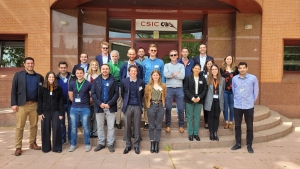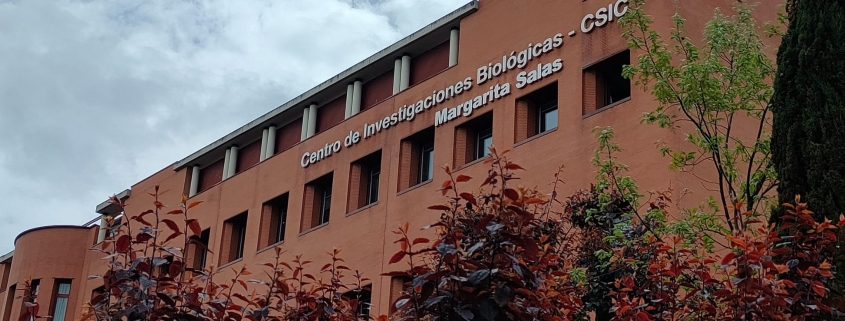BioSFerA H2020, project’s update and meeting in Madrid
For the first time, after two years of project, the BioSFerA Consortium meets in person in Madrid. The first physical meeting took place last 3rd – 4th May at the Center for Biological Research Margarita Salas (CIB) of our partner CSIC, the Spanish National Research Council. The two-days meeting was also the opportunity to visit the CIB-CSIC’s laboratories, where a large number of researchers conduct their researchs on biotechnology, included the experiments for BioSFerA.
Concerning the CSIC’s activities, the research centre is continuing its trials currently dedicated to the genetic modification of selected acetogenic bacterial and oleaginous yeast strains: based on genetic engineering strategies, CSIC has created 8 recombinant Moorella strains with different acetate production rates. Results are still not fully satisfying, so that CSIC will move forward to better understand the recombinant bacterial behaviour, considering extreme fermentation conditions and syngas contaminants. On the other hand, genetic modifications on several genes involved in lipid metabolism are also in progress for Y. lipolytica, the oleaginous yeast used in the triacylglycerides (TAGs) production phase from acetate.
Meanwhile, the investigation of the gas & liquid fermentation processes for the parameters’ optimization are still ongoing. The activities were conducted on pressurized bioreactors of 1 L and 10 L dimensions for CARTIF and BBEPP respectively and using realistic data on the VTT’s syngas mix. They operated in different conditions to explore the factors influencing the acetate production, such as the use of different media or the application of a continuous fermentation mode with a membrane for cell recycling. A general finding from these tests is that increased biomass concentration can lead to higher volumetric acid acetic production. In addition, increased pressure was applied to overcome gas transfer limitations. Further investigations on the oleaginous yeasts’ fermentation step are also proceeding: BBEPP presented the results so far of acetate fermentation trials in the 7 L fed-batch bioreactor applying a pH-static feeding strategy, whereby different trials were performed using the both wild-type and genetically modified Yarrowia strains. CARTIF achieved tests using a fed-batch fermenter and two different continuous feeding strategies (high constant and gradually increased flow rate), but both the feeding and the cell recycling strategies need to be optimised to further increase TAGs production. First experiments were also performed by ENVIPARK with its steam explosion pilot plant as first step in the downstream process for the TAGs recovery. These first trials were conducted using a broth sample provided by BBEPP and literature parameters for an initial setting.
Even the preparations for the pilot process activities are advancing: VTT updates the Consortium with the successful accomplishment of the Factory Acceptance Test and the last steps to conclude the gasification unit, while BBEPP informed about the finalisation of the Bio Base Mobile Pilot Plant (BBMPP) construction. A draft timeline of the work has been presented, defining the transportation of the BBEPP’s mobile unit to the VTT site at the end of the year 2022 and the launch of the pilot process integration within 2023.
Within the progresses of the project’s activities, it is time for the scaling-up of the BioSFerA’s concept, starting with the DFB (Dual Fluidized Bed) gasification system as first block to help its functionality and transferability at industrial level. The techno-economic, environmental and social analysis has started as well. RINA, and the other partners involved in the activity, are preparing the basis for the future assessments related to the LCA/LCC analysis (CERTH), and the social-LCA too (NTUA). One reason of discussion was the current energy crisis and the impact of the COVID-19 outbreak on the expected techno-economic performance indicators, which will need to take into account these aspects.
Finally, the dissemination activities continue to follow the project’s progresses and advance with new activities, such as the release of the official BioSFerA’s newsletter at the end of May and the update of the website with the news related to the pilot process. On the 4th May afternoon, after the meeting, a workshop on “Advanced Technologies for Green Molecules Production” was also organised in hybrid format in synergy with other two projects COS2MOS and Life Biomass C+, giving evidence of the first project’s results and its contribution to the biotechnology research development. After this fruitful meeting, the Consortium expects to meet again in October, this time in Belgium at the BBEPP’s headquarter.
 The BioSFerA Consortium at CSIC premises during the 4th GA meeting
The BioSFerA Consortium at CSIC premises during the 4th GA meeting



